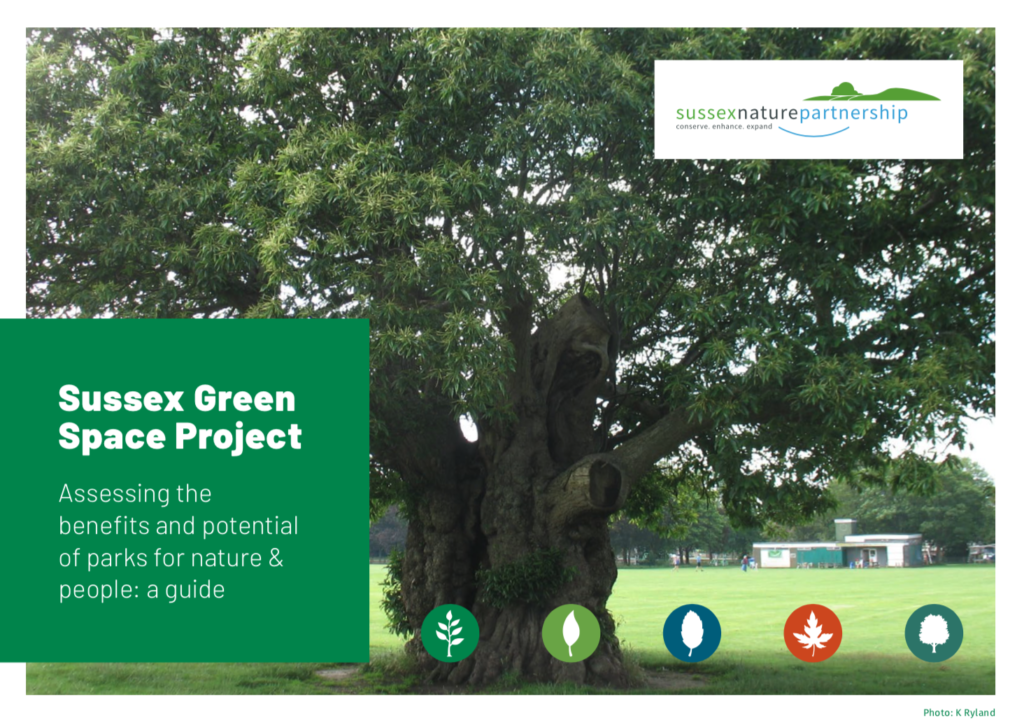Parks for nature and people: a toolkit for park managers

Overview
Evolving from initial thinking by Adur and Worthing Councils and Sussex Nature Partnership, this project was intended to develop a simple approach through which park managers, local authorities, town and parish councils and local people could better understand the potential of the parks and green spaces in their care to deliver more benefits for nature and people. It was tasked to test ‘natural capital’ and ‘social engagement’ approaches to develop a guide for understanding the benefits currently provided by these spaces and for working with park users and local people to ‘co-create’ a new vision for their future .
Project Approach
The project worked across 7 case study sites in two districts of Sussex (Adur & Worthing Councils and Wealden District). These case study areas together covered a range of types of park and green space: town centre formal garden, suburban park, beach, cemetery, country park, local nature reserve and a small local recreation ground.
The project team investigated the habitats and wildlife present on these sites and engaged with local people and park users to identify the natural and human ‘assets’ present in each and to start to identify how and why these spaces were valued by users. They then used a series of simple checklists and tables to start to identify the types of benefits the park might be providing for nature, the local environment, park users and the local community, culture and economy. Initial ideas for enhancing the spaces for nature were then identified and the introduced to local people and park users as a way to ‘start a conversation’ with them about the space and what types of change for both nature and people they would like to see in a future vision for the park.
This approach was set out in an initial guide which can be downloaded below. This guide is intended to help capture initial information and ideas about the value of a park for nature and people and so it is only a first step in the process for ‘re-visioning’ our parks – the ‘scoping’ phase which can then be followed by further steps to help the shape the ideas, share and discuss these with relevant people and then specify the vision and positive changes to be taken forward through a management plan, investment plan or other means.

The guide can be read alongside the case study reports (ecological surveys and social-engagement results) for more information and insights. A final slide-pack was also developed by the project team which summarises the project approach and sets out some wider recommendations for taking this work forward.
Testing in Practice
The initial project has now been completed. The next phase of this work is to test the Assessment Guide further on the ground with willing park managers and local communities. This will take place over the next 6 months. Feedback from that will be used by Sussex Nature Partnership to improve this prototype guide.
In the meantime, please do download and have a look at the document and if you are a park manager, local authority or local community and would like to apply it yourselves, please do. We would be very interested in any feedback you can provide. We have developed an online ‘data collection form’ to go along with the guide. This can help to gather information and auto-develops a report for the park. We can provide you with a link to this if you would find it helpful.
Following the revision of the guide, Sussex Nature Partnership will work with partners to identify how best to build on this project and develop a second phase aimed at supporting park managers and local authorities across Sussex in managing their parks and green spaces for nature and people.
Green Space Assessment: outputs
Toolkit:
Assessing the benefits of parks for nature and people: a guide
Case Study Reports: sample reports for Buckingham Park, Shoreham are provided here to give you a sense of their format and content.
Please contact us if you would like access to the reports for the other case studies.
Buckingham Park, Shoreham-by-Sea
Slide pack: covering project approach, outputs and recommendations
Health Parks Toolkit
Part of the project also involved carrying out ‘health audits’ on parks and green spaces in Wealden District (in Crowborough, Hailsham and Uckfield) to better understand how parks in these communities provide benefits for health and wellbeing. This used the ‘Health Parks Toolkit’ developed by Tisdall & Associates. Audits were carried out on most of the parks in the three towns. This resulted in a health audit report for each park and a synthesis report for each town, which looked at how the parks related to each other and to the distribution of health issues by ward within the towns. Underpinning the synthesis report is a spreadsheet which allows decision-makers to interrogate the information when planning interventions for health. This information has been passed on to the relevant authorities (town, district and county councils) involved.
Health Audit Project: final presentation
Project Funding
Project Funders: East Sussex County Council (Public Health) and South Downs National Park Authority
Project Team: Dolphin Ecological Surveys; Resources4Change; Sussex Nature Partnership, Wealden District Council, Adur & Worthing Councils (Parks and Foreshore Department)
Other Resources
A range of publications and links for further information have been included in the toolkit guide above.
In addition, a new ‘resource hub’ for those interested in creating change for parks and green spaces has been published by the Future Parks Accelerator Fund. This Fund was a collaboration between Heritage Lottery Fund, National Trust and the Department of Levelling UP, Business and Communities. It worked with cities across the UK for three years on an ambitious programme of work focused on understanding the role of urban parks and helping cities transform these places to deliver more for nature, people and climate.
The final synthesis report also provides a snapshot of the work carried out and its main recommendations for the future.
